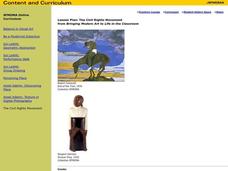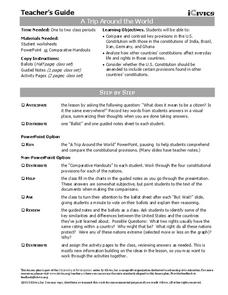Curated OER
Civic Engagement for Us?
Young scholars identify the different forms of civic engagement. They identify their responsibilities at the different levels of government. They also analyze young leaders running for office.
College Board
Civic Knowledge and Action in AP U.S. Government and Politics
Vote, it's your civic duty! The high school lesson focuses on voter turnout and civic participation with a series of activities. Young scholars analyze data to discover voter turnout trends, complete worksheets, and participate in group...
Maryland Department of Education
Our Children Can Soar
Amazing efforts of African American leaders are celebrated in a lesson on civil participation. The engaging resource focuses on primary and secondary sources to analyze the impact of African American leaders such as Ella Fitzgerald....
John F. Kennedy Presidential Library & Museum
Ask Not What Your Country Can Do for You
Ask not what the lesson here can do for you, but what you can do with the lesson. The answer is quite a lot! Young scholars revisit JFK's famous inaugural address with a focus on his plea for civic engagement. There's a...
US Citizenship and Immigration Services
Thanksgiving 1—Pilgrims and American Indians
The Pilgrims first arrived in America in order to gain religious freedom. Here is a lesson that takes the class on this journey with the Pilgrims, stopping to look at how they got here, who they met when they arrived, and a peek into...
US National Archives
Documented Rights Educational Lesson Plan
How have groups struggled to have their unalienable rights recognized in the United States? Acting as a research team for the Human Rights Council of the United Nations, your young historians will break into groups to research...
Curated OER
Martin Luther King Jr. and Nonviolence
Using the book, Martin's Big Words, learners will discover the life of Dr. Martin Luther King Jr. Vocabulary is identified throughout the story by using several his famous protest speeches as examples. Class discussions on racism, during...
Curated OER
The Civil Rights Movement
Students compare and contrast African-American, Asian-American, Chicano and Native-American movements with the civil rights movement and are exposed to the sociopolitical and economic factors involved in the rise of social movements.
Mikva Challenge
The Great Electoral Race Kickoff
Do young people care about elections? Host a discussion about the role of young citizens in the electoral process with an engaging social studies lesson. As high schoolers read and respond to four statements about youth interest in...
Caucus 101
Linkage Institutions: Interest Groups: Option A
How are elections really run and won? Learn about special interest groups, super PACs, and lobbyists with an engaging lesson about the caucus process. Young voters research specific interest groups and analyze their part in previous and...
Curated OER
Photographs of the 369th Infantry and African Americans during World War I
Students engage in a discussion regarding images of war we see, how quickly do we see them, and how they affect us? They view and analyze war photographs taken during World War I.
Curated OER
Growing a Citizen
Students analyze messages and values associated with civic engagement present in the media. They analyze the local community's promotion of values associated with civic engagement by conducting investigative research. They hypothesize...
Curated OER
Manners and Mores of Washington's America
Learners explore the social policies of early America. In this etiquette lesson, students read George Washington's "110 Rules of Civility and Decent Behavior in Company and Conversation." Learners identify expectations for their own...
iCivics
A Trip Around the World
How do the rights of citizens in other countries, such as India, Germany, Brazil, and Iran, compare to those of Americans? Take a closer look at the provisions of various foreign constitutions, and compare and contrast the protections...
Annenberg Foundation
Electoral Politics
You won't just get a lesson plan when you click on this resource. As you click on the related resources located to the left of the screen, you'll find, a professional development video, teacher/student notes, lesson plan, and...
Center for Civic Education
The Power of Nonviolence: Music Can Change the World
Here is a fantastic activity through which class members discover how music has the ability to influence others in a meaningful way. After reviewing selected pieces and modern-day protest songs, learners will research other songs that...
Curated OER
Service Learning Project-American Civil War
Tenth graders study the American Civil War. As part of a service learning project, they volunteer to help preserve or promote a local Civil War site. They conduct research and write letters or lobby legislatures on behalf of historic...
Center for Civic Education
Constitution Day Rap
Engage your class while learning about the US Constitution with this fun primary grade social studies lesson. After viewing a picture of the US Constitution, young learners piece together a US flag using stars and...
Curated OER
Teaching With Documents Lesson Plan: Sioux Treaty of 1868
Students study the Sioux and their lives in the Black Hills before 1868. They engage in a wide variety of cross-curricular activities which give them a good understanding of the Sioux culture.
Curated OER
Thanks Be To You
Students research U.S. history by completing a worksheet activity in class. In this historical figure lesson, students identify the contributions and risks taken by the former African-American leader Martin Luther King Jr. Students read...
Curated OER
Martin Luther King Jr. and Nonviolence
Students explore a local seat of government to examine ways to make changes in their communities. In this local government lesson, students read about Martin Luther King, Jr. and his nonviolent protests. Students read important dates and...
Center for Civic Education
The Power of Nonviolence: What Is Nonviolence? What Does It Cost?
Your young learners will delve into the language of primary source documents in order to identify the characteristics, benefits, and costs of nonviolence. The lesson includes a mix of activities, including an anticipatory activity,...
National Endowment for the Humanities
Revolution '67, Lesson 1: Protest: Why and How
To some people, protesting is as American as apple pie, but the factors that lead to protests can be as confusing to veteran activists as to today's youth. Revolution '67 explores the riots in Newark, New Jersey as a case study. ...
Rutgers University
How the Allies Won World War II: Island-hopping in the Central Pacific
Using primary source documents, young historians explore the strategies the US used to defeat Japan during WWII. They also learn about the American military experience, and innovations that changed the style of warfare. Students benefit...























